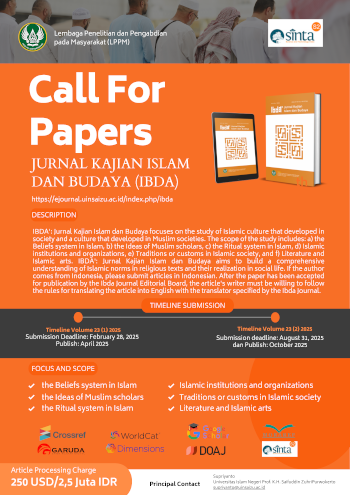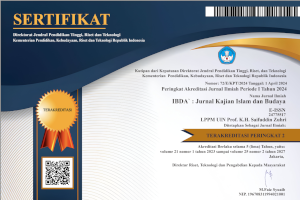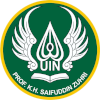The Qur'anic Vision Towards Minorities in a Plural Society: A Case Study in Kudus Regency, Indonesia
DOI:
https://doi.org/10.24090/ibda.v22i2.10724Keywords:
qur'anic vision, minorities, plural society, toleranceAbstract
This paper explores the Qura'nic vision of fostering harmony for minorities in a pluralistic society, using Karangrowo village in Kudus City, Indonesia, as a case study. Karangrowo, Kudus is a village with a long history of religious diversity and coexistence, where Muslims, Christians, and samin (local native faith) live together peacefully. The qualitative research method employed in this study involves collecting data related to the theme and conducting interviews with key informants considered to have expertise in the relevant topic. The paper analyzes the Qura'nic verses that promote tolerance, respect, dialogue, and cooperation among religious groups and how they are implemented in Kudus regency people's social and cultural practices. The paper also examines the challenges and opportunities for enhancing the Qura'nic vision of minority protection in the context of contemporary Indonesia, which faces various issues such as radicalism, extremism, and intolerance. The Qura'nic values of minorities are relevant and essential for creating harmony for minorities in a pluralistic society. Kudus can serve as a model and inspiration for other regions in Indonesia to create harmony and develop an inclusive society.Downloads
References
al-Maraghi, A. bin M. (1946a). Tafsir al-Maraghi (Vol. 3). Syirkah Maktabah.
al-Maraghi, A. bin M. (1946b). Tafsir al-Maraghi (Vol. 5). Syirkah Maktabah.
al-Tabari, A. J. (2000). Jami’ul Bayan Fi Ta’wil al-Qur’an (Vol. 18). Mua’sasah al-Risalah.
Anjum, O. (n.d.). The "Constitution" of Medina: Translation, Commentary, and Meaning Today. Yaqeen Institute for Islamic Research. Retrieved January 10, 2024, from https://yaqeeninstitute.org/read/paper/the-constitution-of-medina-translation-commentary-and-meaning-today
Arifin, A., Askar, R. A., Ningrum, D. A., Rizal, A. N. S., & Mumtaz, N. M. (2023, May 26). Reconstructing Hadith Understanding An analysis of Hadith in the Book of Tuḥfah al-Aḥważī on Religious Intolerance. IGCIIS. Proceedings of the 5th International Graduate Conference in Islam and Interdisciplinary Studies, IGCIIS 2022, 19-20 October 2022, Mataram, Lombok, Indonesia, Lombok. http://dx.doi.org/10.4108/eai.19-10-2022.2329041
Arshad, M. (2023). Increasing Extremism and Religious Intolerance in Pakistan. European Journal of Philosophy, Culture and Religion, 7(1), 42–55. https://doi.org/10.47672/ejpcr.1441
Atlas, J. Y. (2015). Islam and Peace. In L. Bouckaert & M. Chatterji (Eds.), Contributions to Conflict Management, Peace Economics and Development (Vol. 24, pp. 169–181). Emerald Group Publishing Limited. https://doi.org/10.1108/S1572-832320150000024009
Baidhawy, Z. (2015). Fikih Kebinekaan. In Wawan Gunawan, A. Wahid, M. A. Darraz, & A. F. Fanani (Eds.), Piagam Madinah dan Pancasila: Prinsip-Prinsip Kehidupan Bersama Dalam Berbangsa dan Bernegara. Mizan Pustaka.
BBC News. (2023, July 5). Penganut agama minoritas ingin diakui secara “legal” demi mengakhiri “diskriminasi”: “Saya Yahudi, tapi di KTP Islam.” BBC News Indonesia. https://www.bbc.com/indonesia/articles/c4np11vdzpko
Bulac, A. (1998). The Medina Document. In C. Kurzman (Ed.), Liberal Islam (pp. 169–179). Oxford University Press.
Creswell, J. W. (2014). Reserach Design, Pendekatan Kualitatif -Kuantitatif dan mix method (A. Fawaid, Trans.; Third). Pustaka Pelajar.
Croucher, S. M., Holody, K. J., Hicks, M. V., Oommen, D., & DeMaris, A. (2011). An examination of conflict style preferences in India. International Journal of Conflict Management, 22(1), 10–34. https://doi.org/10.1108/10444061111103607
Damayanti, A. N., & Sartini. (2023). Sunan Kudus' Strategic Approach To Cultural Adaptation In The Self-Other Perspective. Al-Shajarah: Journal of the International Institute of Islamic Thought and Civilization (ISTAC), 28(2). https://doi.org/10.31436/shajarah.v28i2.1114
Daniel M. Nainggolan. (2023). Intolerance and Fear: A Critical Analysis of Cases of Religious Intolerance in Indonesia Based on a Study by Martha Nussbaum. Formosa Journal of Multidisciplinary Research, 2(1), 41–54. https://doi.org/10.55927/fjmr.v2i1.2802
Darwanto, H. (2022, September 15). Nilai Toleransi Masyarakat Karangrowo [Wawancara].
Hasan, N. (2017). Religious Diversity and Blasphemy Law: Understanding Growing Religious Conflict and Intolerance in Post-Suharto Indonesia. Al-Jami'ah: Journal of Islamic Studies, 55(1), 105–126. https://doi.org/10.14421/ajis.2017.551.105-126
Hisyam, A. M. bin. (1955). Sirah Nabawiyah Li Ibni Hisyam (Vol. 2). Syirkah Maktabah.
Institute, S. (2022). Mengatasi Intoleransi Dalam Tata Kebinekaan Indonesia: Update Dan Rekomendasi Terkait Peribadatan. Setara Institute. https://setara-institute.org/mengatasi-intoleransi-dalam-tata-kebinekaan-indonesia-update-dan-rekomendasi-terkait-peribadatan/
Institute, S. (2023). Indeks Kota Toleran Tahun 2022. Setara Institut For Democracy and Peace.
Kandath, K. (2006). Critical approaches to community conflict in developing countries: A case study of India. In J. Oetzel & S. Ting-Toomey (Eds.), The SAGE Handbook of Conflict Communication. Sage Publications.
Kusnandar, V. B. (2021). Sebanyak 86,93% Penduduk Indonesia Beragama Islam pada 31 Desember 2021 | Databoks. https://databoks.katadata.co.id/datapublish/2022/02/12/sebanyak-8693-penduduk-indonesia-beragama-islam-pada-31-desember-2021
M. Quraish Shihab. (2000). Tafsi al- Misbah Pesan, Kesan dan Keserasian Al-Qur’an (Vol. 7). Lentera Hati.
March, A. (2019). The Caliphate of Man. Harvard University Press.
Marshall, P. (2018). The Ambiguities of Religious Freedom in Indonesia. The Review of Faith & International Affairs, 16(1), 85–96. https://doi.org/10.1080/15570274.2018.1433588
Maskat. (2022, September 27). Sikap Semeleh Sedulur Sikep [Wawancara].
mediaindonesia.com. (2024). Bela Warga Gaza, Presiden Harvard Claudine Gay Diteror dan Dituduh Anti-Semitisme. https://mediaindonesia.com/internasional/641608/bela-warga-gaza-presiden-harvard-claudine-gay-diteror-dan-dituduh-anti-semitisme
Muhammadun Toha. (2022, September 25). Islam Rahmatan lil Alamin dan Toleransi Antar Umat Beragama [Wawancara].
Niti. (2022, September 23). Ajaran Samin dan Kerukunan Umat Beragama [Wawancara].
Ridha, M. R. bin ali. (1990). Tafsir al-manar (Vol. 4). al-Haiah al Misriyah al A’mah li al-Kitab.
Sahide, A., Azhar, M., & Jatmika, S. (2022). The Role of Local Elite in the Transformation of Intolerant Values in Indonesia. International Journal of Multicultural and Multireligious Understanding, 9(12), 210. https://doi.org/10.18415/ijmmu.v9i12.4138
Seasia.co. (2023). Water Buffalo for Eid al-Adha: A Symbol of Tolerance in Kudus, Indonesia. Seasia.Co. https://seasia.co/2023/06/24/water-buffalo-for-eid-al-adha-a-symbol-of-tolerance-in-kudus-indonesia
Sulthon, M. (2000). Islam dan Kebudayaan Jawa. In M. D. Amin (Ed.), Interelasi Nilai Jawa dan Islam Perspektif Ekonomi. Gama Media.
Sunyoto, A. (2017). Atlas Walisongo. Pustaka Aiman.
Suwarni, S. (2022, September 16). Kasih Kristus dan Semangat Toleransi [Wawancara].
Wani, H., Abdullah, R., & Chang, L. (2015). An Islamic Perspective in Managing Religious Diversity. Religions, 6(2), 642–656. https://doi.org/10.3390/rel6020642
Wolff, S. (2020). Intersections: Pluralism and Conflict Prevention. Global Center for Pluralism.
Yildirim, Y. (2009). The Medina Charter: A Historical Case of Conflict Resolution. Islam and Christian–Muslim Relations, 20(4), 439–450. https://doi.org/10.1080/09596410903194894
Zuly Qodir. (2015). Fikih Kebinekaan. In Wawan Gunawan, A. Wahid, M. A. Darraz, & A. F. Fanani (Eds.), Pemikiran Islam, Multikulturalisme Dan Kewargaan. Mizan Pustaka.
Downloads
Published
How to Cite
Issue
Section
License
Copyright (c) 2024 Abdul Fatah, Imam Sadili, Arif Friyadi, Aufa Abdillah

This work is licensed under a Creative Commons Attribution-ShareAlike 4.0 International License.
Authors who publish with this journal agree to the following terms:
- Authors retain copyright and grant the journal right of first publication with the work simultaneously licensed under a Creative Commons Attribution-ShareAlike License a that allows others to share the work with an acknowledgement of the work's authorship and initial publication in this journal.
- Authors are able to enter into separate, additional contractual arrangements for the non-exclusive distribution of the journal's published version of the work (e.g., post it to an institutional repository or publish it in a book), with an acknowledgment of its initial publication in this journal.
- Authors are permitted and encouraged to post their work online (e.g., in institutional repositories or on their website) before and during the submission process, as it can lead to productive exchanges, as well as earlier and greater citation of published work (See The Effect of Open Access).
















